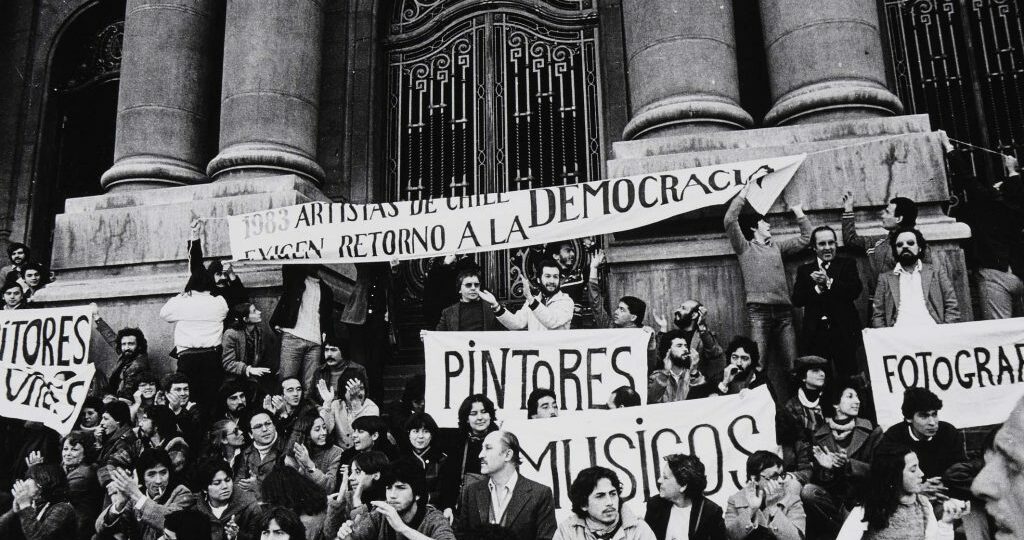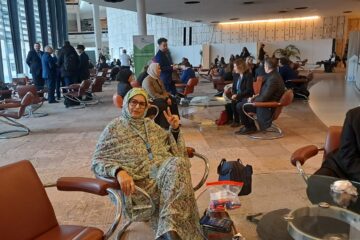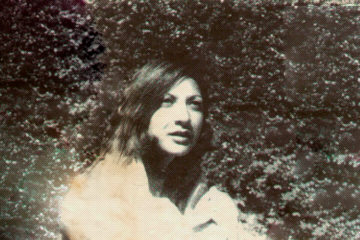On a September 11th just like today, 50 years ago, military troops led by General Augusto Pinochet stormed La Moneda, Chile’s presidential palace, overthrew Salvador Allende, of Popular Unity (Unidad Popular), elected in 1970, and ultimately led to his death. The military dictatorship that ensued, from 1973 to 1990, was destructive: dozens of thousands of people were killed, disappeared, were persecuted, arrested, and tortured; public and community spaces were shut down and restricted by military violence; art and culture were censored; Indigenous peoples and peasants were forced out of their lands; in rural and urban areas, people’s lives became more precarious, and work, housing, and health conditions became increasingly worse.
The military dictatorship in Chile was part of a wave of authoritarianism, military intervention, and US imperialism over the Latin American region in the second half of the 20th century. Its trails remain across all these territories, in the lack of policies dedicated to memory, truth, and justice for the crimes committed under the dictatorship, and in the maintenance of an economic model based on profit, inequality, and subordination to transnational capital, militarism, the lack of rights, and the precariousness of life.
This is why the people of Chile and so many other parts of the Americas say today “never again!” and fight to change these marks from the past in the present and to build a radical people’s democracy. These are struggles that emerge in the present, including the 2019 social estallido, which demanded the resignation of the then president Sebastián Piñera, the end of neoliberal policies, rights for Indigenous peoples and women, and a new Constitution that was completely different from the one in force, which was drafted by the military regime. These are also struggles that are continuously built through resistance in the territories, with community organizing and proposed alternatives to reorganize life and society.
Today, September 11th, 2023, we publish at Capire seven poems written under the dictatorship by three Chilean women writers: Elvira Hernández, Teresa Calderón, and Eugenia Brito, authors of La Bandera de Chile (1991), Causas perdidas (1984), and Vía pública (1984), respectively. These books expose death, enforced disappearance, censorship, and forced disruption of the social fabric in Chile’s everyday life. These are also books that exercise new ways of saying, not saying, and articulating words and images in times of fragmentation. Through art that is not always linear, yet open to the unknown and the displacement of language, these artists go against silencing and express their rebelliousness and a collective desire for change and freedom.

The Chilean Flag is a foreigner in her own country
she doesn’t have ID
she isn’t majority
she is no longer recognized
the prolonged fasting has put death’s thumb upon her
the churches administer her last rites
the Legations’ party horn and sound of the trumpets
The Chilean Flag forces herself to be more than a flag
///
The Chilean Flag is ‘used as a gag
and that’s why surely that’s why
no one says anything’
///
The Chilean Flag declares two points
her silence
Elvira Hernández, translated by Alec Schumacher (La Bandera de Chile, 1991; The Chilean Flag, 2019)

Feats of Memory
There is a house,
a house
that shut
its doors.
It gradually
died
in the name
and grace
of the very same
life.
This house
has abandoned
the hall
solemnly
and didn’t leave
photographs
or ghosts
whispering
around
on the stairs;
not even
a splendor
of voices
gestating
in the servants’
quarters
offended in the shadow,
crying
their right
to memory
This house
where there are no
ancestors
climbing up
time,
tangling up
relatives
into
the earth
where they
a d d u p.

Delay
They started to gather
deliberate words
one
by
one
they went in
through the door slot
where letters appear
now and then
when the house
is
empty.
Teresa Calderón (Causas perdidas, 1984)

Exile
I.
Yesterday I called you
and my own shadow
answered the phone
II.
Goodbye I said gently
and the street grew bigger and bigger
like the night
III.
Your body struggles at the wall.
My room
cannot let you go
without hurting me
IV.
Haggard ghost from the dawn
Singing its own tango
standing and weeping
by the balcony of a woman
who is also a ghost.

Script of the disappeared
Rebuilding the light for those who will never see it again
the light that is born from them
sheltered light remaining in the
attic of the
disappeared,
crossed-out gaze
it is the reconstituted script of this death
not completed lived
as it comes back unfinished
to watch life from afar.
Script of upside-down thought in this subliminal facet
on the edge of any subverted chimera
Script of this attic and its dim
persistence
when the city, turned around its own offertory,
turns into sanctuary
From where glimmering dead emerge
Through the threatening glow of cactuses
their eyes gaze at the living with lust.
But there is more: they put big matt glass
sheets
to resist the crossing of defenseless
buildings.
Challenging the color of the sun
with their piercing underground green
they flood the city.
Their ancient spring then grows
where the living submerge like an unrelenting
dream.
Eugenia Brito (Vía pública, 1984)




